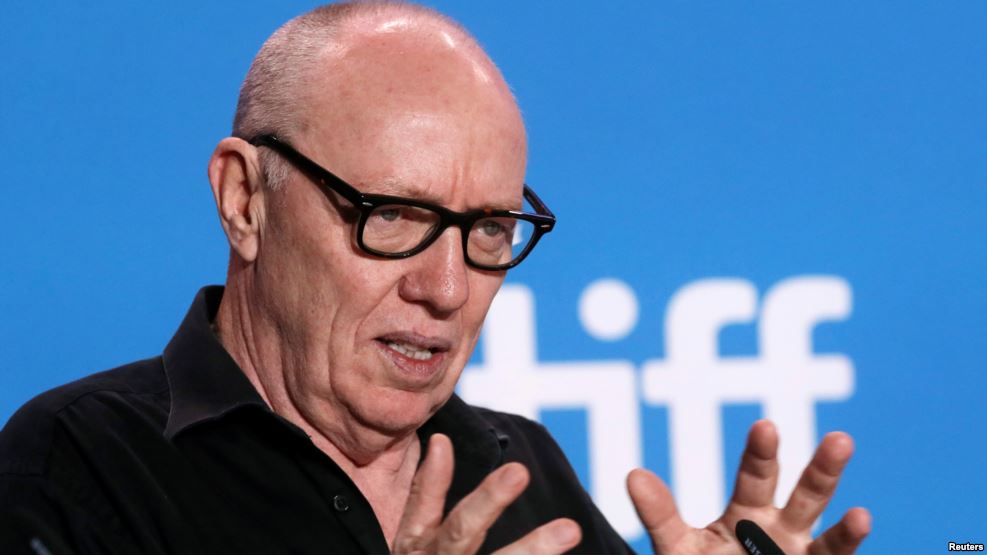The main purpose was to show that people stood up again: Terry George

Kirk Kirkorian’s “The Promise” film’s premiere was on September 11, 2016, at Toronto International Film Festival (tiff). The film was shown in Toronto’s Roy Thomson Hall. The film director is Oscar-winning Terry George. Among actors are Charlotte Le Bon, Oscar Isaac, Christian Bale, Angela Sarafyan, Shohreh Aghdashloo, Marwan Kenzari and Jean Reno. Other celebrities who walked on the red carpet included also Atom Egoyan, Arsinee Khanjian and Serj Tankian.
The audience greeted the actors with ovations standing for more than ten minutes. Among the invited guests in the hall was also Susanna Harutyunyan, film critic and Artistic Director of the Golden Apricot Yerevan International Film Festival, who had an interview with Terry George. He said that he did it to take the key of the similar events of the Genocide, outbreak of war, massacre. Interview with prominent film director Terry George is introduced below.
You touched very important points.
Yes. The main purpose was to show that people stood up again after the slaughter. I needed to explain that: a young Armenian man, a sophisticated Armenian woman from Paris and an American, who knew politics, but new nothing about the Genocide. And not in a way that you can startle, but take an audience through a story. The love story is the key to open up the subject. It’s a strategy. The love triangle against the background of huge historical events. So I thought this is a way to show. I had a catch word, which was Peoria, which is the very center of the US. The same in Hotel Rwanda. It has to be available, as a peace of entertainment to the audience, so that was the challenge and more difficult with this, because it’s a hundred years ago event.
90% or more than other people say that they knew nothing about that, which is a horrific thing to say, and that’s the main point of the movie, that the first great Genocide of the 20th century came up with the world. And if we can do that it’s a great thing.
My number one rule, as a filmmaker, is entertainment. People have to pay money, I have to entertain them and I have to create characters that the audience not just identified but that those characters became their eyes and ears and they moved through this, incredible situations which we have met and that’s all has been my strategy, find characters that can take an audience through a dramatic or cataclysmic event and make it accessful, at the same time, make the audience love, hate the characters.
What do you think, can the film or the art of the film in general help justice prevail or can movies have big impact on the world’s society?
Yes. I think in terms of mostly engaging people. The film is probably still the most impressive, even more than the documentary. There are great documentaries that break your heart, but in a documentary you can’t go inside the character, whereas in a feature film you can take the audience to the intimate moments, exchanges and experiences. A book for sure does this as well. But it’s a personal experience, and cinema is a collective experience, and you can feel that. For me one of the greatest tragedies is the loss of this particular element in the cinema.
There are things that we can’t lose, historic dramas, like collective experience in the dark room of anger, empathy, sorrow, tears, joy, these and similar emotions need to be caught by cinema. Netflix and others, all these people are doing these dramas, ok, but it’s not the same. We are losing cultural experience. Let’s have a cruciaded mind. I don’t know maybe this comes from the audience. I’m not sure.
Maybe this is the main reason that drew you to this very particular historical subject, like Ireland, Rwanda, Armenian Genocide.
Well, it’s an evolution. The first films that I worked on was In the Name of the Father, The Shore, Some Mother’s Son and that was personal, I was telling the story of the people I really knew. I saw the impact of these films, it’s a tough task writing and directing a film. To have a reason get up in the morning, but the satisfaction is given back to you, you know Hotel Rwanda, In the Name of the Father or whatever change some people’s perceptions, it’s very gratifying.
What was the reason you first came to Armenia?
Actually I was researching another story, that of bishop Grigori Balakian. There was one point I was going to do, a version of his story. So I came to Yerevan, but that was a fast journey. Then I left for Istanbul. And I went to the militarian museum in Istanbul, to the Armenian Cathedral, to get the sense of the favor and then I went to Berlin, to Charlesbourg to the street Talaat Pasha stood, number 26. So I did the research in terms of all of that. And this came along.
What reaction do you anticipate from the Turkish side regarding this film?
It’s a really interesting reaction. Last night, before the premiere we had a rating on IMDb over 1500, one star of the ten, this morning it was up to 6000. The Turkish Government has spent a lot of money on making movies about Musada in Hollywood in the 50s and 70s. We’re hearing from that. But we expect their reaction and giving president Erdogan use of insoaking Turkishness as a law. I’m sure, we’ll come to that category on several occasions, but it’s a debate that has to be either. And it’s a wonderful moment by British Jeffrey Robertson, he’s presenting the case in this, and he says the question isn’t if this happened or not, that’s a given historical fact, it’s why. Why did this happen and how do we present this? That’s the point why people should be dehumanized and dead to the slaughter, what’s their need to destroy a whole nation and culture. So, that’s the situation given Yezidis, Syria, Iraq and what’s happening at the moment.
By Susanna Harutyunyan

























